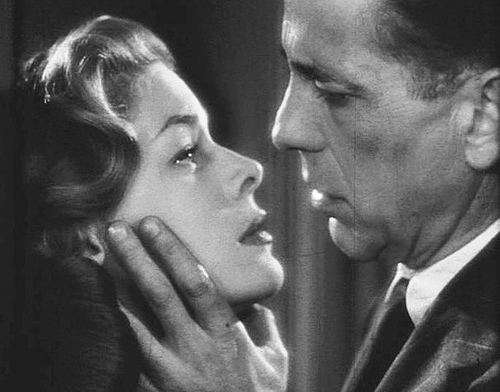
Humphrey Bogart was buried, creepily, with a whistle.
He had given it to Lauren Bacall after their first film together, To Have and Have Not, and she deposited it with his remains at Forest Lawn.
It’s inscribed “If you want anything, just whistle.”

Humphrey Bogart was buried, creepily, with a whistle.
He had given it to Lauren Bacall after their first film together, To Have and Have Not, and she deposited it with his remains at Forest Lawn.
It’s inscribed “If you want anything, just whistle.”

Preparing for heart surgery at age 81, Rodney Dangerfield was asked how long he’d be in the hospital.
“If all goes well, about a week,” he said. “If not, about an hour and a half.”
Marvin Hamlisch won four Emmys, four Grammys, three Oscars, a Tony, two Golden Globes, and the Pulitzer Prize.
What’s unusual about this game by Joseph Blackburne, apart from its characteristic brilliance?
1.e4 e6 2.d4 d5 3.Nc3 Nf6 4.Bg5 Be7 5.Bxf6 Bxf6 6.Nf3 O-O 7.Bd3 Nc6 8.e5 Be7 9.h4 f6 10.Ng5 fxg5 11.Bxh7+ Kxh7 12.hxg5 Kg8
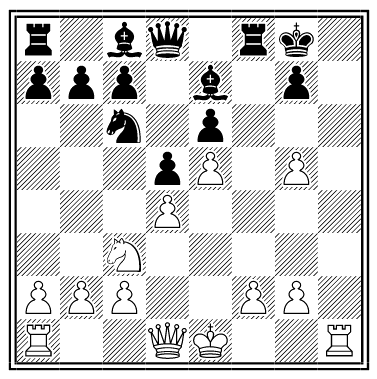
13.Rh8+ Kxh8 14.Qh5+ Kg8 15.g6 Rf5 16.Qh7+ Kf8 17.Qh8#
“Move for move I played it exactly in the same way twice in one week, once at Hastings and once at Eastbourne, in the year 1894.”
– Attributed (tenuously) to the Marylebone Cricket Club. See Amputee Cricket.
Performing in Kid Boots in Chicago, Eddie Cantor received a 12-page telegram from Florenz Ziegfeld with suggestions for improving the show. “The whole message [was] such a jumble of ideas” that Cantor simply responded:
YES.
Ziegfeld wrote back:
WHAT DO YOU MEAN YES? DO YOU MEAN YES YOU WILL TAKE OUT THE SONG OR YES YOU WILL PUT IN THE LINES OR YES YOU WILL FIX THAT SCENE OR YES YOU HAVE TALKED TO THOSE ACTORS?
Cantor responded:
NO.
It’s commonly said that a queen is worth nine pawns. Is that estimate accurate? In 1846, General Guingret and Lionel Kieseritzky decided to find out:
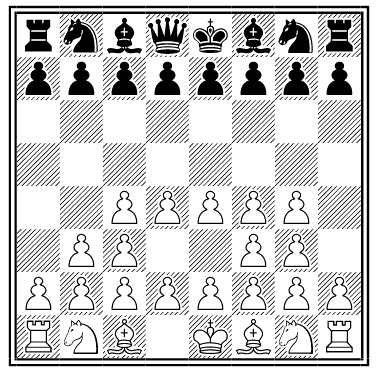
1. e5 e6 2. d5 d6 3. e4 c6 4. exd6 cxd5 5. e5 b6 6. d4 f6 7. Bd3 g6 8. Be3 Nc6 9. c5 Bg7 10. b4 Bd7 11. b5 bxc5 12. bxc6 Bxc6 13. dxc5 fxe5 14. fxe5 Bxe5 15. Nd2 Rb8 16. Rb1 Qf6 17. Ne2 Qg7 18. O-O g5 19. Nb3 h5 20. Bd4 hxg4 21. fxg4 Kd7 22. f4 Bxd4+ 23. Nbxd4 Nf6 24. f5 e5 25. Ne6 Rxh2 26. Nxg7 Nxg4 27 f6 e4 28. f7 Rbh8 29. f8=N+ Kc8 30. d7+ Kb7 31. d8=N+ 32. Ka8
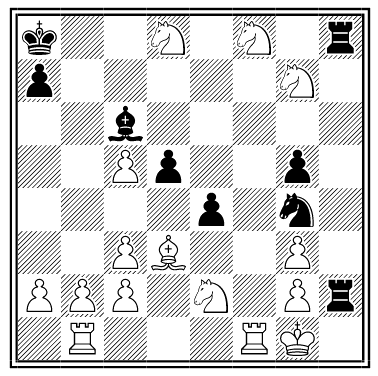
And White can no longer forestall mate on h1.
So the queen is worth more than nine pawns — if it’s wielded by Kieseritzky.
Tim Krabbé published an eye-opening problem in Schaakbulletin in 1972. White must mate in 2 from this position:
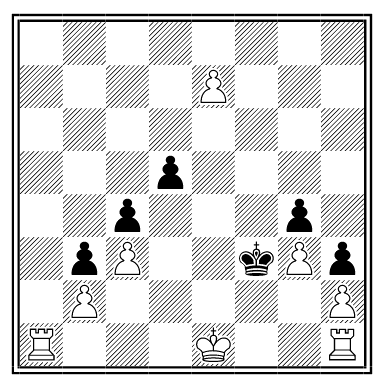
He does so with 1. e8=R! Kg2 2. O-O-O-O-O-O#:
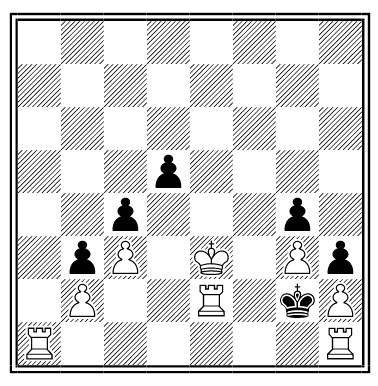
O-O-O-O-O-O denotes “vertical castling” — the king castles with the new rook on e8. Amazingly, this was arguably legal at the time — here’s how the rules defined castling:
“The king is transferred from its original square, two squares toward the rook; then that rook toward which the king has moved is transferred over the king to the square immediately adjacent to the king.”
All other stipulations are met: Neither the king nor the rook has moved previously, and the king passes through no square guarded by Black.
So, legal, right? Alas, after much debate in Dutch and Belgian chess columns, FIDE revised its rules to refer to a rook “on the same rank.” Some people have no imagination.
01/30/2012 UPDATE: I find the same idea mentioned in the April 1970 issue of the Journal of Recreational Mathematics — David Silverman says he proposed an “impossible” two-move checkmate, “a problem that generated a lot of heat,” for the Litton Problematical Recreations series following Richard Epstein’s discovery of a similar loophole in Hoyle’s Book of Rules. This anticipates Krabbé’s publication by two years.
When the 18-year-old Ethel Barrymore informed her father that she was engaged, he wired:
CONGRATULATIONS LOVE FATHER
When she informed him she’d broken it off, he wrote:
CONGRATULATIONS LOVE FATHER
Fielding positions in “Who’s on First?”:
When Dodgers shortstop Chin-Lung Hu singled in a 2007 game against the Padres, announcer Vin Scully said, “And Hu’s on first.”